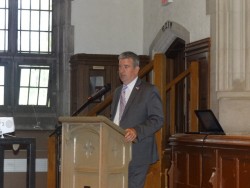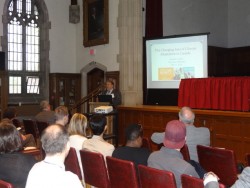May 26, 2015
OCC’s Annual Symposium Continues to Spark Climate Conversations
Two weeks ago, the Ontario Climate Consortium held its 3rd Annual Climate Change Symposium at McMaster University in Hamilton Ontario. The event, which showcased research and action to address climate change in Ontario, was attended by more than 150 people from academia, all levels of government, and the private sector. An important aim of the event is to engage students and provide an opportunity for them to highlight their work, and build their experience. In that regard, the Graduate Student Poster Competition was a definite highlight of the day. We received 23 poster submissions from students representing 7 universities across the province. These posters examined a wide range of climate change research topics, including low carbon energy, IDF curves, and municipal governance.
The winning poster – “Help Stop Climate Change! Recover Waste Heat from Sewers and Reduce Fossil Fuel Use for Space and Water Heating” – was submitted by Devon Calder, a graduate student at York University. The runner-up – “A Comparison of Methods for Updating IDF curves in the Toronto and Essex Regions” – was submitted by Marc D’Alessandro, a graduate student at the University of Waterloo. Congratulations!
The keynote speakers – The Honourable Glen Murray, Ontario’s Minister of Environment and Climate Change, and David McLaughlin, former head of the National Roundtable on the Environment and the Economy (NRTEE) and currently a strategic advisor on sustainability in the Faculty of Environment at the University of Waterloo – did a great job of setting the stage for the panel sessions.
 Glen Murray noted that, given current global emission trends, we are on track for at least 4°C of warming. Thus both mitigation and adaptation are critically important: mitigation to keep the world within a threshold that can be adapted to, and adaptation to help limit risk and build resiliency to the climate changes that we are already committed to because of historic emissions. Glen also rightly noted the important role that academic institutions, such as OCC’s University members, play in informing policy development. He noted that, while politicians often turn a deaf ear to scientists, this is one area where politicians need to start doing a better job of integrating science into decision-making.
Glen Murray noted that, given current global emission trends, we are on track for at least 4°C of warming. Thus both mitigation and adaptation are critically important: mitigation to keep the world within a threshold that can be adapted to, and adaptation to help limit risk and build resiliency to the climate changes that we are already committed to because of historic emissions. Glen also rightly noted the important role that academic institutions, such as OCC’s University members, play in informing policy development. He noted that, while politicians often turn a deaf ear to scientists, this is one area where politicians need to start doing a better job of integrating science into decision-making.
 David McLaughlin did a great job of highlighting the potential economic costs, and human health impacts associated with climate change. As a result climate change is increasingly recognized as a major priority by actors across the political spectrum. While perspectives on how to tackle the problem, and its relative priority, differ, all major political parties have staked out a position – particularly on GHG reductions. David pointed out that there is relatively less attention being paid to adaptation at the policy level in Canada, which translates to the public who are bewildered by the issue. For more detail on David McLaughlin’s keynote speech, see his blog post.
David McLaughlin did a great job of highlighting the potential economic costs, and human health impacts associated with climate change. As a result climate change is increasingly recognized as a major priority by actors across the political spectrum. While perspectives on how to tackle the problem, and its relative priority, differ, all major political parties have staked out a position – particularly on GHG reductions. David pointed out that there is relatively less attention being paid to adaptation at the policy level in Canada, which translates to the public who are bewildered by the issue. For more detail on David McLaughlin’s keynote speech, see his blog post.
After the keynotes, a panel of business association representatives discussed approaches to addressing climate change within their respective industries. Based on the panel presentations, business sector action on climate adaptation remains relatively nascent. Much more emphasis has been placed on climate change mitigation. Tom Rand, a clean tech expert, noted the important synergies that exist within the electricity and building sectors around low carbon distributed energy solutions, and the disruptive role that development of these solutions could have for the traditional electricity transmission and distribution model.
After the business panel, the session delved into a discussion about how collaboration is essential to achieving an interdisciplinary perspective for climate change adaptation and mitigation strategies. Sarah Burch from the University of Waterloo started off the panel with a discussion about how we have reached a point where we know a lot about impacts of climate change and now we need a vision of the future that we can all get behind. One way to do this would be to create different scenarios based on different degrees of mitigation and adaptation (for example, no action versus deep sustainability) which can help people visualize what type of future they want to see for their communities. Gordon McBean from Western University and Scott Kalafatis from GLISA also echoed her sentiments and added that it is important to engage boundary organizations in outreach work as they live between the interface of science and policy, thus providing a safe space for scientists and policy-makers to interact with one another.
Following a student research poster question-and-answer period, the final panel of the day discussed the role of art, activism and social movements in addressing climate change. A common theme which emerged from all speakers was that not only science is required to solve climate change, but that it also takes art and activist movements to communicate its urgency, and to motivate industry and government. Joan Sullivan in particular highlighted the similarities between the ongoing climate change activist movement and that of the AIDS movement in the 1980s that fought for access to medicine. She argued that where we are today as a society is almost exactly where social movements found themselves back then – on the cusp of success as long as we push forward with more science, more art and more activism. Her positive inspiration aligned closely with that of Robert Shirkey, a municipal lawyer advocating the idea of climate change warning labels on gasoline pumps. All panelists agreed with Joan Sullivan whole-heartedly in that we need to ‘change the story’ and emphasize positivity, focus on solutions, change social norms and even use humour to create the future we want.
In sum, it was an inspiring event that helped engage the audience in discussions about how to respond to climate change from both a mitigation and adaptation perspective. Participants were pleased with the cross-disciplinary nature of the day, and the ability to engage in the subject from a variety of perspectives.
Next year’s Symposium will be held at the University of Guelph. We are looking forward to another successful event!
About the bloggers
Ian McVey is a Project Manager with the Ontario Climate Consortium. He is interested in investigating the links that exist between climate change and mainstream policy areas such as land-use planning. Simran Chattha is a Coordinator of Climate Research Mobilization with the Ontario Climate Consortium. Her research interests lie on the interface of environmental policy and climate change adaptation. Glenn Milner is a Research Analyst of Climate Information with the Ontario Climate Consortium. He is interested in learning about climate information anywhere and everywhere as well as learning about how to make it more readily available.




Comments are closed here.